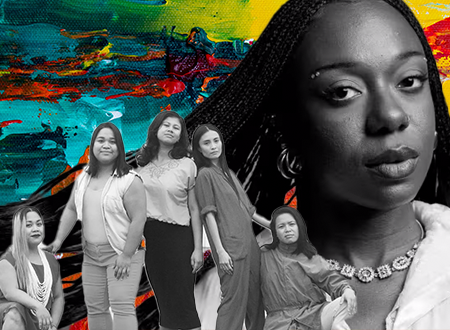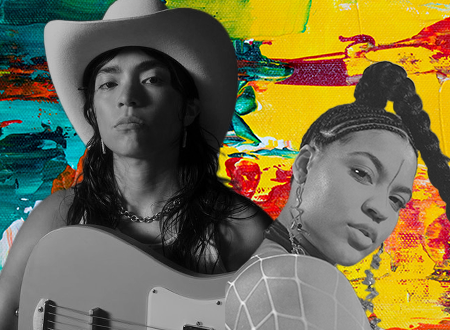Playlist: Fresh Off The Press - Pride Edition (June 2024)
By Margot Boatright & Julia Girdharry

At Precision Record Pressing, we celebrate diversity by showcasing works that foster awareness and artistic expression. This month’s Fresh Off The Press playlist features talents that exemplify courage and truth.
Being queer is profound and beautiful. It’s a complex gift that unwraps itself over time; it’s a way of understanding yourself and your place in the world. It can feel illuminatingly intimate or joyously collective. It can be camp, it can be eloquence; it can be arduous, it can be celebratory.
The best art explores these dichotomies. It recontextualizes, reclaims, and furthers our communities, extending the abiding artistic tradition of the Queer Canon.
The following artists proudly bring their queerness into their art, making universal their personal and often expanding our narratives of queer culture past a cis-centered, white-washed, Westernized idea of sexuality and gender.
Happy Pride loves! – Margot Boatright


Pantayo
Meaning “For Us” in Tagalog, Pantayo embodies the recontextualization of diasporic traditions into a contemporary Queer narrative. The “Us” can center around many of the veins that inform the Tkaronto based group’s body of work – often embodying all these identities intersectionally – foregrounding their Filipinx heritage, their queerness, and their care for preserving the vibrant sound of the kulintang.
Kulintang is a type of gong and instrument ensemble indigenous to groups in Southeast Asia, particularly in regions of modern day Philippines, Malaysia, and Indonesia. Pantayo carries this powerful instrument from the traditional gong-chime culture of this region into their music, at once blazing and sublime, charged and adventurous.
Their sophomore album – 2023’s Ang Pagdaloy, released on Tkaronto’s Telephone Explosion Records – showcases their variant applications of the kulintang’s buzzy, metallic chime, coaxing myriad sonic possibilities out of it. From self-assured queer love (making) songs – One More Latch (Give It To Ya) – to the synth-like bells of Masanguanan proposing a more inclusive future, Pantayo’s queer, Filipinx “kulintang gong punk” energy permeates front to back.
Myst Milano.
Electronic music is born out of queer and Black culture in Chicago, Detroit, New York, and London. It has literally always been gay, always been trans, always been vanguarded by people of color. Don’t let any EDM-touting, revisionist gatekeepers tell you otherwise.
As club music – be it House, Disco, Techno, Bass, Jungle – has moved out of the underground and into the mainstream over the decades, a countervailing force tries to water it down for mass-market consumption, stripping the sound of queerness, of Blackness, of empowered otherness from these genres.
Myst Milano. is an antidote to any stale mainstreaming of electronic music. Their ethos is one of authenticity, control, and inclusivity, punctuated through fiery lines, frenzied beats, and avant-garde aestheticism.
Their most recent album – 2023’s Beyond the Uncanny Valley, released on Toronto’s Halocline Trance – is a comprehensive course in queer, Black sonic creation. Hip-hop, House, Breakbeat, Funk, regional club music a la Philly, and Baltimore – it’s all there. In encompassing all these musical motifs, they skirt categorization entirely, skewing definitions in favor of weirdness, funkiness, fierce futurosity. (Oh, the queerness of it all!)
Pressure would be an aural blitz solely as an instrumental, but once Myst’s vocals come in, a wave of excited wooziness sets in, the listener is at once in awe of their lyricism and entranced to move. Black Rainbow / Uncanny Valley is an expert-level course in flow; No Sleep deftly blurs the state lines between Baltimore club and Chicago ghetto house.
It’s easy to get caught up in the histories, the academia, and the rich cultural background inherent in all of Myst’s music, but that can also detract from the simple fact: it goes so hard. It’s uncontrollably groovy, undeniably hot, inexplicably propulsive. Any DJ could needle drop any of their tracks and the crowd would ignite.
Their DJ sets: Legendary.
Their albums: Polaris Prize-nominated.
Yet even more integral to their artistry is their dedication to mentoring queer, trans, and BIPOC people within the electronic music community, ensuring that artists today aren’t excluded from the music and opportunities created by their predecessors.
Reyna Tropical
Fabi Reyna is Reyna Tropical and founder of She Shreds Magazine, has profoundly impacted the music community, revolutionizing media representation for women, nonbinary musicians, and LGBTQ+ perspectives. Though She Shreds was established nearly a decade ago, Fabi reshaped interview approaches, prioritizing skills over objectification and fostering a more inclusive discourse in music journalism.
Her Mexican heritage from Tamaulipas deeply embedded Reyna Tropical’s music, enriched by Afro-Mexican influences that underpin her tagline, “Queer Love and Afro-Mexico.” This cultural backdrop amplifies perspectives often overlooked in mainstream Mexican representation, advocating for inclusivity and cultural understanding beyond borders. Fabi’s dedication extends to promoting LGBTQ+ visibility through Reyna Tropical, creating a space where queer narratives thrive, inspiring solidarity and empowerment globally. The concept of identity is explored in many of her songs, highlighting the dynamic and ever-changing nature of diasporic diversity and influence. For instance, Huītzilin, named after the Nahuatl word for “hummingbird,” morphs grungy guitar riffs and scattered chirps into a slow ballad that embraces life’s perpetual transformations.
Debby Friday
Debby Friday channels her anger into an energy that reflects how the world perceives her identity and body. Her EP Bitchpunk is a heart-stopping and head-pounding tapestry of genres, leaning towards violent punk and aggressive drill. It’s a raw and visceral experience, burning with anger born out of necessity, breaking down barriers by tearing them apart, ensuring the identity of a queer, Black woman is never glamorized. The concept of change is present, capturing her experience as a queer Black musician, portraying it as a force that requires an outlet to not only showcase but to further her journey in introspection.
This self-reflection extends to Friday’s family heritage. Moving to Canada from Nigeria with her Yoruba mother at the age of two, she identifies with both cultures. Growing up in the Western world, her experience of her background differs from someone who was born and raised in Nigeria. This reflects the experience of many in the diaspora or immigrant young people, whose cultural identities are constantly evolving. This duality informs her music, blending the rawness of her Punk and Drill influences with the complex layers of her Nigerian and Canadian identities.